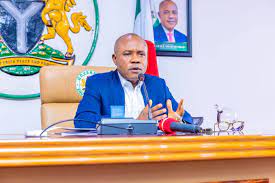The Senate, an upper chamber of the National Assembly, has received a request by President Goodluck Jonathan seeking the renewal of the six-month old state of emergency in three-crisis ridden states in the north-eastern part of the country. However, the second chamber of the National Assembly whose deliberations and approval of the request is vital is engrossed in a serious crisis soon after resuming from month-long recess to deliberate on the presidential request. The emergency period which ends today was the third declared in the troubled region in May this year after two other emergencies were declared earlier in May and November, 2013.
The latest move to re-impose the emergency rule was vehemently opposed by the senators from the affected states of Borno, Yobe and Adamawa who threatened to seek the co-operation of their colleagues to block the passage of the president’s request because they believed that the government was only implementing the emergency rule theoretically.
Similarly, leading politicians and concerned Nigerians have been dismissing the attempt to re-introduce the emergency rule mainly for using the unrest as a propaganda gimmick to buttress its claims that elections could not hold in the three states due to the prevailing massive unrest. But everyone knows that it was a hype which clearly advertises the government’s gross inability to contain the situation by ending the lingering crisis promptly and decisively.
The so-called state of emergencies imposed earlier did not achieve the desired objectives; besides, they had only given the government an excellent opportunity to squander national wealth inappropriately and irresponsibly instead of using them fully to augment developmental efforts. Before the advent of the emergency rule the defiant Boko Haram has killed over two-thousand people since 2009 without acquiring any territorial foothold, but almost a year after the seemingly ineffective emergency rule regimes, Boko Haram has attacked several Local Government Areas, overrunning many towns and villages which were declared caliphates, and are still being occupied. Against that backdrop it could be argued that the restoration of the emergency rule at a time when the country is heading for election is a superfluous exercise which could only worsen the security situation in the affected areas and further deprive the peoples of the area of their constitutional rights.
In that context it can be reasonably said that Jonathan administration is actually out of touch with realities. It cannot accurately read a prevailing situation with a view to proffering an appropriate solution to it. The extension of the gratuitous state of emergency is being widely viewed as another plan to further subject the already beleaguered area to an additional round of untold hardship under severe draconian conditions. It was precisely because of that the government had continually repeated such damnable mistakes in its quest to find durable solutions to the problems warranting the emergency.
Subsequent renewals of the rule in the past had only heralded the coming of a season of endless emergencies signifying the ineptitude of the government to deal decisively with any urgent situation that threatens to disrupt orderliness and the welfare of the people.
In fact political pundits are ascribing sinister motive for that ill-advised move, and that may not be unconnected with the obnoxious schemes of some southern politicians lurking unpromisingly at the corridors of power, continually devising cunning and underhand plots to achieve their grand anti-northern objectives. These include the marginalization of its leading citizens as well as frustrating renowned political figures and sabotaging the economy of the area. Precisely because of that Southern politicians, led by the leading Northern antagonist, Chief Edwin Clark, are now calling for the imposition of total emergency rule in the North which will allow the replacement of the three elected governors with President Jonathan’s surrogates.
The northerners, and indeed many other Nigerians, contend that there are one hundred and one ways to skin a cat, and therefore did not applaud the restoration of the emergency rule which they believed was not the right step in the right direction towards resolving the perennial unrest that bedevils the North generally.
It was widely believed that the Tanimu Turaki committee set up by President Goodluck Jonathan many months, to facilitate dialogue with the insurgents of the north-east, through a negotiated settlement, ago will bring the hostilities to an end and elicit great expectations and bring comfort to the concerned Nigerians, but alas, it did not. Its final report did not provide any glitter of hope to the despondent victims of the infamous Boko Haram sect. President Jonathan, while receiving the committee’s report, did not indicate any forthcoming assistance to injured parties in the dispute, but somewhat immediately announced the revitalization of an awe-inspiring state of emergency when everybody expected that the report of the special committee would end the previous one. In that case it was far from certain if both the emergency order and the dialogue committee have served the purposes for which they have been established. It is clear, therefore, the solution to these nuisances does not lie in state of emergency imposed haphazardly, but in constructive planning and thinking which involve dialogue, because there is nothing that cannot be dialogued.



